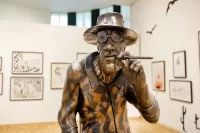
Award-winning author John Edgar Wideman to speak at Bates on Martin Luther King Jr. Day
Novelist John Edgar Wideman, two-time winner of the PEN/Faulkner Award, and Sharon Robinson, daughter of baseball great Jackie Robinson, will speak at Bates College on Martin Luther King Jr. Day as part of a two-day series of activities and workshops focused on Two Societies: A Focus on Class through the Lenses of Race and Gender. The public is invited to attend all events free of charge.
Wideman will deliver the keynote address, Looking for Emmett Till, at 10:30 a.m. Monday, Jan. 18, in the Clifton Daggett Gray Athletic Building, 130 Central Ave. Sharon Robinson, director of educational programming for Major League Baseball, and daughter of the famed Brooklyn Dodger Jackie Robinson, will discuss Building a Legacy: Martin Luther King Jr. and Jackie Robinson at 1 p.m. and again at 2:45 p.m. in the Edmund S. Muskie Archives, 70 Campus Ave.
Author of a new novel Two Cities (Houghton Mifflin, 1998), Wideman, whom The Lost Angeles Times calls “our most powerful and accomplished artist of the urban black world” is the first two-time recipient of the PEN/Faulkner Award, which he won in 1984 for Sent for You Yesterday and again in 1990 for Philadelphia Fire (Vintage 1991). In 1998, Wideman won the Rea Award for the Short Story (previous winners include John Cheever and Eudora Welty). In 1990, Wideman also received the American Book Award for Fiction. He was awarded the Lannan Literary Fellowship for Fiction in 1991 and the MacArthur Award in 1993. Other honors include the St. Botolph Literary Award (1993), the DuSable Museum Prize for Nonfiction for Brothers and Keepers (1985), the Longwood College Medal for Literary Excellence and the National Magazine Editors’ Prize for Short Fiction (1987).
His 12 fiction and two nonfiction works include National Book Award finalist Fatheralong: A Meditation on Fathers and Sons, Race and Society (Pantheon, 1994) and Brothers and Keepers (Holt and Winston: 1984).
Born to a working class African-American family in Pittsburgh, Wideman earned membership in Phi Beta Kappa and graduated with a degree in English from the University of Pennsylvania, where he also won All-Ivy League status as a forward on the basketball team. Wideman was awarded a Rhodes Scholarship to study philosophy at Oxford University’s New College. He was the subject of a 1963 Look magazine article “The Astonishing John Wideman.” Long interested in becoming a novelist, he starting writing at the conclusion of his Oxford years.
Returning to the United States in 1966, Wideman spent a year as a Kent Fellow at the University of Iowa’s Writers’ Workshop, where he completed his first novel, A Glance Away, published in 1967. Other novels include Hurry Home, The Lynchers, Hiding Place and The Cattle Killing. His short story collections are Damballah, Fever, The Stories of John Edgar Wideman and All Stories Are True.
Wideman’s own life provided the basis for some of his writing. His brother was convicted and sentenced to life for murder committed during a robbery. The event set the scene for Wideman’s memoir Brothers and Keepers. Called “a literary tour-de-force” by Library Journal, his novel The Cattle Killing is about love and family, ancestors and inheritance, slavery and freedom and the bonds separating blacks and whites.
A resident of Amherst, Mass., Wideman is a professor of English at the University of Massachusetts at Amherst. His articles on Malcom X, Spike Lee, Denzel Washington, Michael Jordan, Emmett Till, Thelonius Monk and women’s professional basketball have appeared in The New Yorker, Vogue, Esquire, Emerge and The New York Times Magazine. He also enjoys following the career of his daughter, Jamilla Wideman, a WNBA star, profiled as a Stanford University basketball standout in a 1997 Sports Illustrated cover story.
Additional events for the day include a drop-in coffee-hour commemorative in Chase Hall Lounge beginning at 8 a.m., including video clips of King’s marches in Chicago to challenge fair housing, an Andrew Young speech highlighting King’s relationship to Benjamin Mays, Bates class of 1920, and the famous I Have A Dream speech from August 1963.
Wideman’s talk will be followed by a series of concurrent afternoon workshops sponsored by academic departments. The first series, scheduled from 1 to 2:30 p.m., and the second from 2:45 to 4:15 p.m., will take place at locations throughout the campus. A partial schedule of the day’s events follows. For more information, call 207-786-6330 or 207-786-6222.
Concurrent Workshops from 1 p.m. to 2:30 p.m.
- Building a Legacy: Martin Luther King Jr. And Jackie Robinson, Sharon Robinson
- Location: The Edmund S. Muskie Archives
- COINTELPRO: The FBI’s Covert War Against U.S. Citizens, Joan Elbert, peace and justice activist and former neighbor of the murdered Black Panther leader Fred Hampton.
- Location: Skelton Lounge, Chase Hall
- Class on Campus and in the Community, a discussion of attitudes and research on class at Bates and in Lewiston, presented by women’s studies and the English department.
- Location: Carnegie 204
- Scapegoating Welfare Recipients: Race, Gender and Class Stereotypes, presented by the sociology department with a featured speaker from the Massachusetts-based Coalition for Basic Human Needs.
- Location: Chase Hall Lounge
- Harriet Tubman Visits a Therapist, a two-woman, 25-minute, one-act award-winning play by Carolyn Gage, a lecturer in theater at Bates. A gripping confrontation between two women who share the same oppression, but whose definitions of survival are in direct conflict.
- Location: Filene Room, Pettigrew Hall
Concurrent Workshops from 2:45 p.m. to 4:15 p.m.
- Building a Legacy: Martin Luther King Jr. and Jackie Robinson, Sharon Robinson
- Location: The Edmund S. Muskie Archives
- COINTELPRO: The FBI’s Covert War Against U.S. Citizens, Joan Elbert, peace and justice activist and former neighbor of the murdered Black Panther leader Fred Hampton.
- Location: Skelton Lounge, Chase Hall
- Educational Equity: Do Today’s American Schoolchildren Have Equal Educational Opportunity, will include an education department presentation of segments from Bill Moyers’ documentary Children in America’s Schools.
- Location: Room 113, Carnegie Science
- Duke Ellington and the Civil Rights Movement, a presentation by Marcus Bruce, associate professor of philosophy and religion, American cultural studies and African American studies, and Thomas Hayward, humanities reference librarian and lecturer in classics.
- Location: Room 104, Olin Arts Center
- Pepe Danquart’s Schwarzfahrer (Black Rider), winner of the Academy Award for Best Live Action Short Film of 1994. The film features performing artist Paul Outlaw who will introduce the 12-minute comedy that explores issues of race in Germany by following a streetcar ride in Berlin with a German widow and African-American male.
- Location: Room 105, Olin Arts Center
- “Blue Eyes,” a video and discussion sponsored by the psychology department. A sequel to Jane Elliot’s famed study on bias and prejudice where elementary school students were divided in class by eye color.
- Location: Room 204, Carnegie Science
In addition to the workshop sessions, The Stuart Sisters, a dramatic duo from Philadelphia who present a poignant history of American life, featuring the African-American experience, will perform at 2:30 p.m. and 7 p.m. in the Olin Arts Center Concert Hall. The earlier performance is scheduled to accommodate the work schedules of college staff. Families with children also are especially invited to attend this afternoon performance.
On Sunday, Jan. 17, at 7 p.m. in the Bates College Chapel, the Rev. Dr. Gloria White-Hammond, pediatrician at the South End Community Health Clinic and associate pastor of the Bethel African Methodist Episcopal Church in Boston, will deliver the 1998 Martin Luther King Jr. Lecture, with music for the accompanying service provided by Cultured Voices and the Bates Community Gospel Ensemble.
Bates takes a special interest in events related to King because one of the civil-rights leader’s mentors was the late Benjamin E. Mays, a 1920 Bates graduate. Mays was the long-time president of Morehouse College, King’s alma mater, and a lifelong adviser to King, who was assassinated in 1968. Mays delivered the eulogy at King’s funeral.
The events at Bates commemorate the birthday of King, who would have been 70 years old on Jan. 15. There will be no classes at Bates Jan. 18 to allow students and the rest of the college community to participate in the public events and discussions in observance of King’s birthday.
For further information, call 207-786-6330 or 207-786-6222.




